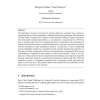Free Online Productivity Tools
i2Speak
i2Symbol
i2OCR
iTex2Img
iWeb2Print
iWeb2Shot
i2Type
iPdf2Split
iPdf2Merge
i2Bopomofo
i2Arabic
i2Style
i2Image
i2PDF
iLatex2Rtf
Sci2ools
ENTCS
2007
2007
A Bayesian Model for Event-based Trust
The application scenarios envisioned for ‘global ubiquitous computing’ have unique requirements that are often incompatible with traditional security paradigms. One alternative currently being investigated is to support security decision-making by explicit representation of principals’ trusting relationships, i.e., via systems for computational trust. We focus here on systems where trust in a computational entity is interpreted as the expectation of certain future behaviour based on behavioural patterns of the past, and concern ourselves with the foundations of such probabilistic systems. In particular, we aim at establishing formal probabilistic models for computational trust and their fundamental properties. In the paper we define a mathematical measure for quantitatively comparing the effectiveness of probabilistic computational trust systems in various environments. Using it, we compare some of the systems from the computational trust literature; the comparison is derived ...
Related Content
| Added | 13 Dec 2010 |
| Updated | 13 Dec 2010 |
| Type | Journal |
| Year | 2007 |
| Where | ENTCS |
| Authors | Mogens Nielsen, Karl Krukow, Vladimiro Sassone |
Comments (0)

